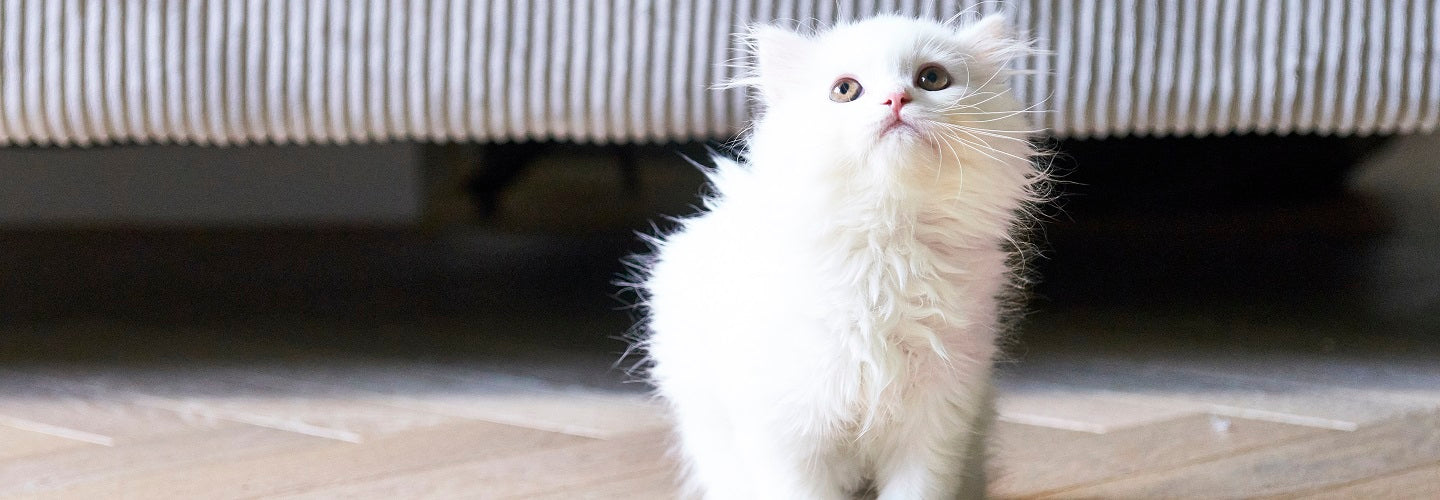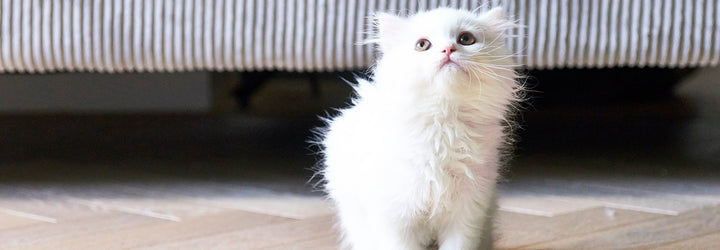

Posted by Emma Oldroyd, on
Tiny Paws Nutrition: Feeding Your Kitten
When it comes to kittens, these baby carnivores need a variety of ingredients to give them the right start to life. Kittens will naturally wean off their mother’s milk (or kitten milk alternatives) between the age of 8-12 weeks, this is a gradual process as they start their journey into solid foods and new, exciting tastes.

Creating the right dining environment
Before you begin a feeding schedule and bring your kitten home, it’s important to remember that cats and kittens are very sensitive to their feeding environment. We would recommend setting up your kitten’s feeding area away from your own to start, as this can help avoid begging and nibbling on human food.
It’s also crucial to keep their food and water bowls not only separate from each other, but, as far away from their litter tray as possible!
What should I feed my kitten?
As kittens are growing faster than their digestive and immune systems are developing, they have very specific nutritional needs that are different from adult cats. Kittens need a diet with a higher energy and protein content, plus immune-boosting nutrients and the right balance of vitamins and minerals.
Kitten food should meet all of the below to offer them the perfectly balanced diet to give them a healthy start:
- High energy provision and quality proteins to help them grow
- Strengthen immature immune system
- Easily digestible
- Tailored to mouth size and dental structure
- Aids cognitive, skeletal and cell growth.
Kitten food is different from cat food in many ways. The dry kibble itself is smaller so it’s easier for tiny, adorable mouths to eat.
Kitten food also has more calories and higher levels of certain nutrients. Some of these nutrients include:
Protein
As carnivores, cats need more protein than dogs. Kittens, however, need even more protein, and more essential amino acids such as arginine, lysine, and methionine than adult cats to support their rapid growth and development.
Fat
Kittens need more essential fatty acids to support their rapid growth and development.
Calcium and Phosphorus
Kittens need more calcium and phosphorus than adult cats to support growth and development of their bones and teeth.
DHA
The omega-3 fatty acid DHA is important for brain and vision development.
Vitamins and Minerals
Cats need adequate daily intake of vitamins and minerals, but kittens need more magnesium, copper, iodine, and vitamin A than adult cats.
Taurine
Taurine is crucial to the healthy development of kittens and the lifelong health of cats. Unlike most other animals, cats cannot synthesis enough taurine to meet their needs, and taurine plays a central role in digestion and excretion of toxins. So, all cats need a dietary source of taurine to maintain healthy function of their digestive, reproductive system and eye and brain development.
Before bringing your kitten home, check the food they’re used to and the quantity they’re fed daily. Any sudden changes in their diet can upset your kitten’s stomach and they’ll adapt more easily to their new home if their food is familiar.
How often should I feed my kitten?
Kittens have small stomachs and high energy needs, so they need to be fed little and often. Remember to check their food and replace it four times a day if you’re feeding a wet or mixed diet. Cats have naturally evolved to avoid foods they believe are stagnant, so replacing frequently, with the kitten having visibility can help develop a feeding routine.
How much should I feed my kitten?
This totally depends on your kitten! We recommend to always follow the recommended feeding quantities on your kitten’s food packaging and contact your vet for advice if you’re concerned about their weight or growth.
Remember to always have clean, fresh water available for your kitten.
What if my kitten won’t drink from a bowl?
It’s true that some cats and kittens don’t like standing water, but there are plenty of options available to help ensure your cat is hydrated. Firstly, if you’re feeding a mixed or wet diet- this will help contribute to their daily water intake. Secondly, investing in a water fountain which provides a ‘running water’ solution will help keep your cat both hydrated and occupied!
If you’re looking for the right kitten food, or find you have a fussy eater, why not take our quiz and create a personalised nutritional plan to find them the perfect diet! Our pet experts are also available in store or online to help with any nutritional questions you might have.

